Testing fragrances at night gives perfumers unique insights you won't get during daylight hours. Your body chemistry changes considerably while you sleep – with lower temperatures, different pH levels, and altered hormone patterns all affecting how a scent develops. The calm, quiet environment also lets testers detect subtle notes they might miss during active hours. These nighttime conditions reveal a fragrance's true character, opening up a whole new dimension of scent evaluation.
The Chemistry Behind Nighttime Scent Evolution
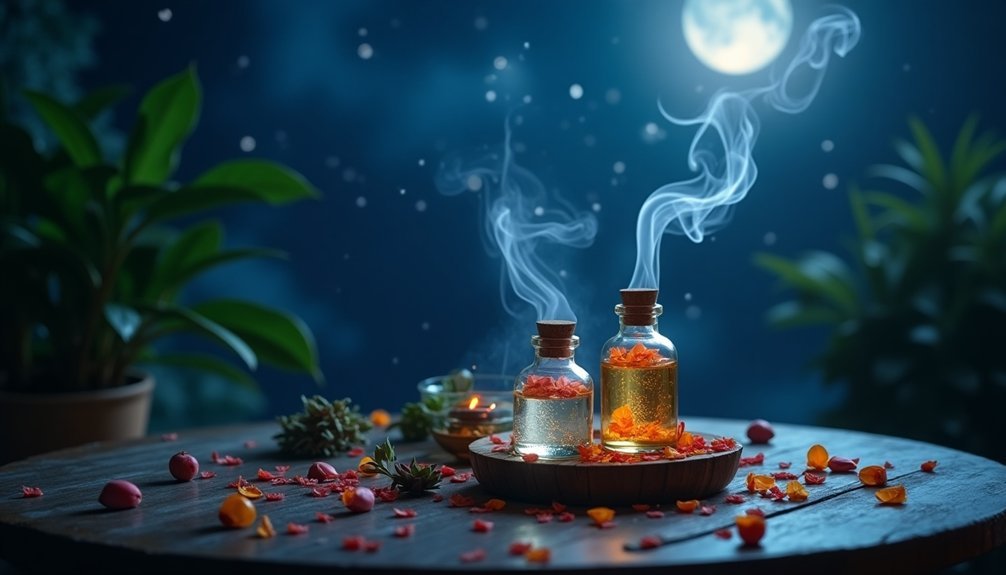
While your fragrance may smell delightful during the day, its chemistry undergoes fascinating changes as night falls. Your body's natural temperature fluctuations play a significant role in how perfume ingredients interact with your skin, particularly as your body cools during sleep hours.
The nighttime scent evolution reveals important aspects of a fragrance's overall quality. As the lighter top notes fade away, the middle and base notes become more prominent, creating a different olfactory experience.
Your skin's natural oils and sweat patterns shift during the evening, affecting how the scent develops and persists. That's why fragrance makers pay close attention to these nocturnal transformations, considering factors like bedroom temperature and bedding materials that can influence how you'll experience the perfume throughout the night.
Body Temperature Changes and Fragrance Performance
Your body's natural cooling during sleep directly affects how fragrances evolve on your skin, with the lower temperature causing scent molecules to project differently than they'd during warmer daytime hours.
You'll notice that your nighttime skin chemistry creates unique patterns in fragrance development, as certain notes become more prominent while others fade into the background.
The temperature drop can greatly impact a perfume's longevity, which is why fragrance makers test their creations during sleep cycles to guarantee peak performance throughout the night.
Skin Chemistry After Sunset
As the sun sets and darkness falls, your body's natural temperature regulation system shifts into its nighttime pattern, directly impacting how fragrances perform on your skin. Your skin chemistry undergoes significant changes after dark, affecting how nighttime perfume interacts with your body.
| Time of Day | Skin Changes | Fragrance Effects |
|---|---|---|
| Evening | Temperature drops | Slower evaporation |
| Night | pH levels shift | Different scent profiles |
| Late Night | Chemistry alters | Modified longevity |
These nocturnal changes mean your favorite fragrance notes might express themselves differently than during daylight hours. As your body cools, the evaporation rate of scent molecules slows down, creating unique scent profiles you won't experience during the day. That's why perfumers specifically test fragrances at night – to guarantee their creations maintain their intended character even as your skin chemistry changes.
Nocturnal Scent Development Patterns
Body temperature plays a central role in how fragrances develop throughout the night. As you sleep, your body temperature naturally decreases, creating unique conditions that affect how a fragrance interacts with your skin.
This nocturnal drop in temperature allows perfumers to observe how scents perform when your body's warmth isn't amplifying their projection.
During these nighttime tests, you'll notice that fragrances often reveal their softer, more delicate notes. This insight is particularly valuable for creating bedtime scents that won't overwhelm you during rest.
Your olfactory system becomes less sensitive at night, making it easier for fragrance makers to evaluate how scents will perform in subdued conditions. By understanding these nocturnal development patterns, they can guarantee your fragrance remains pleasant and subtle throughout your sleep cycle.
Temperature Impact On Longevity
Three key factors determine how temperature affects your fragrance's longevity throughout the night. Your body temperature naturally fluctuates during sleep, creating a dynamic environment that influences how your fragrance performs.
When you're warmer, fragrance molecules become more volatile, intensifying the initial scent projection. As your temperature drops during sleep, the fragrance evolution changes.
- Higher body temperature accelerates top note evaporation
- Cooler nighttime conditions slow down scent diffusion
- Temperature impact varies between light and heavy notes
- Humidity levels affect how the fragrance projects
- Base notes become more prominent as temperature decreases
Understanding these temperature-related changes helps perfumers develop fragrances that maintain their intended properties throughout your sleep cycle.
They specifically test scents at night to observe how temperature variations affect fragrance performance in real-world conditions.
Natural Skin Reactions During Sleep Hours
Your skin undergoes significant changes while you sleep, with hormonal fluctuations affecting how fragrances interact with your body chemistry.
At night, your skin temperature naturally drops, which can alter the way perfume molecules evaporate and project from your skin's surface.
Your sweat production patterns also shift during sleep hours, creating a unique environment that affects how fragrances develop and persist throughout the night.
Nighttime Hormonal Changes
When night falls, a complex cascade of hormonal changes transforms how your skin interacts with fragrances. Sleep experts have found that your body's natural melatonin production directly impacts your skin chemistry and fragrance perception.
These nighttime hormonal changes create unique conditions that fragrance makers must understand to develop effective scents.
- Your melatonin levels rise considerably, altering how fragrances develop on your skin
- Your body temperature naturally drops, changing how scents project from your skin
- Your skin's oil production fluctuates throughout the night
- Your body's moisture levels shift, affecting how fragrances are absorbed
- Your skin may become more sensitive to certain fragrance ingredients
These biological changes explain why perfume makers test their creations during nighttime hours, ensuring their formulations work harmoniously with your body's natural rhythms.
Skin Temperature During Sleep
Body temperature naturally dips during sleep hours, creating distinct conditions for fragrance testing. Your skin temperature drops considerably while you're sleeping, which affects how fragrances interact with your skin chemistry. This cooler surface temperature can alter the way scent molecules develop and project throughout the night.
When you're asleep, your body produces less natural oils, impacting how fragrances perform on your skin. The combination of reduced oil production and lower skin temperature often results in a lighter scent experience compared to daytime wear.
Your sleeping skin also undergoes repair processes that can influence how fragrance compounds are absorbed and maintained. That's why fragrance makers test scents at night – to understand how their formulations hold up under these unique physiological conditions.
Sweat Production Patterns
Since perspiration levels naturally decrease during sleep hours, fragrances interact differently with your skin's surface compared to daytime wear. Your body's sweat production patterns shift dramatically at night, creating unique conditions that affect how perfumes develop and last on your skin.
- Your skin chemistry changes throughout the night due to reduced perspiration.
- Night versus day testing reveals how scents perform under lower sweat conditions.
- Fragrance longevity often improves during sleep due to decreased moisture interference.
- Your natural skin oils become more prominent when sweat production drops.
- Perfume notes develop differently on cooler, less sweaty skin.
Understanding these nighttime changes helps fragrance makers create scents that perform well around the clock. They specifically test fragrances during sleep hours to guarantee their products maintain their intended character despite your body's natural fluctuations in sweat production.
Environmental Factors in Dark Period Testing
The practice of fragrance testing at night introduces unique environmental variables that markedly impact scent performance.
When you're sleeping, environmental factors like temperature fluctuations and humidity levels interact differently with fragrances than during daytime wear. You'll find that dark conditions create a distinct testing environment, allowing perfumers to evaluate how scents perform in low-light settings – particularly relevant for nighttime fragrance applications.
The evening's quieter atmosphere lets you focus purely on the fragrance experience without competing scents or daily distractions.
As you rest, your bedding materials also play a role in how the perfume develops throughout the night. This extended wear period reveals essential information about long-lasting scents, showing how they evolve and persist over time – insights that might be missed during shorter daytime testing sessions.
Extended Wear Analysis Methods
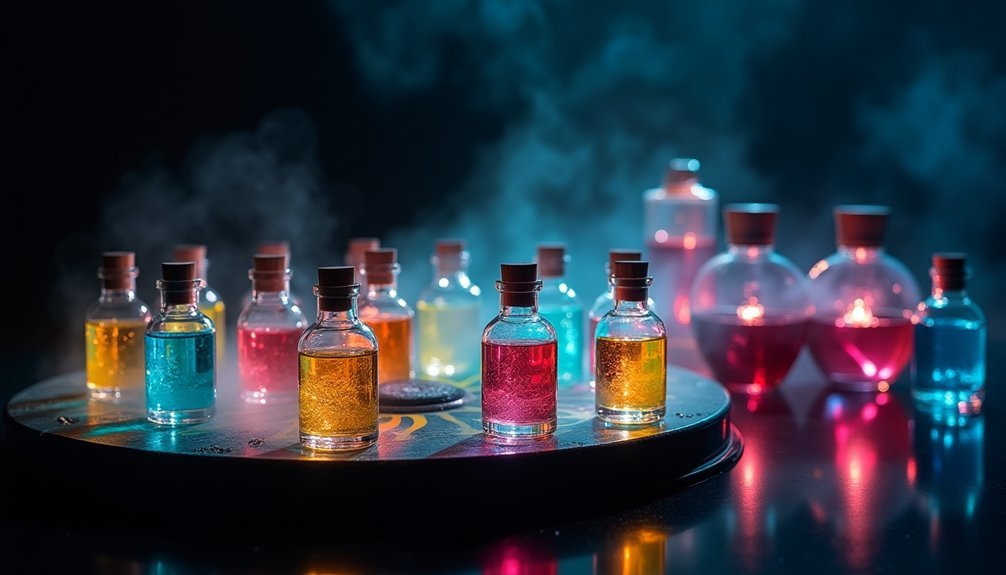
While perfume testing traditionally occurs during daylight hours, extended wear analysis at night offers unique insights into fragrance performance.
You'll discover how scents evolve during your sleep cycle, as nighttime applications reveal complex interactions between ingredients and your resting body chemistry.
- Your skin temperature changes during sleep, affecting how fragrance formulations develop
- You'll experience how the scent interacts with bedding materials and nighttime conditions
- The extended wear analysis tracks longevity over 7-8 hours of rest
- You can observe subtle notes that might be missed during active daytime wear
- Your resting state provides clearer insights into the fragrance's true character
This testing method helps perfumers understand how their creations perform in relaxed environments, ensuring the scent maintains its intended appeal throughout the night.
Fragrance Projection in Calm Settings
Understanding fragrance projection requires careful observation in calm environments, where scents reveal their true character without interference from daily activities.
When you're testing fragrances at night, you'll notice how scents evolve differently in a calm setting compared to daytime wear. Your reduced body heat and movement during these quiet hours allow you to assess the fragrance's true longevity without external factors masking its development.
This tranquil environment helps you identify the emotional effects that certain scents might've on your state of mind, particularly important for bedtime fragrances.
Testing in a peaceful nighttime atmosphere also lets you detect any potential discomfort the fragrance might cause during extended wear. You'll gain clearer insights into how the scent projects and transforms over time without the distraction of sunlight or physical activity.
Documentation Techniques for Overnight Results
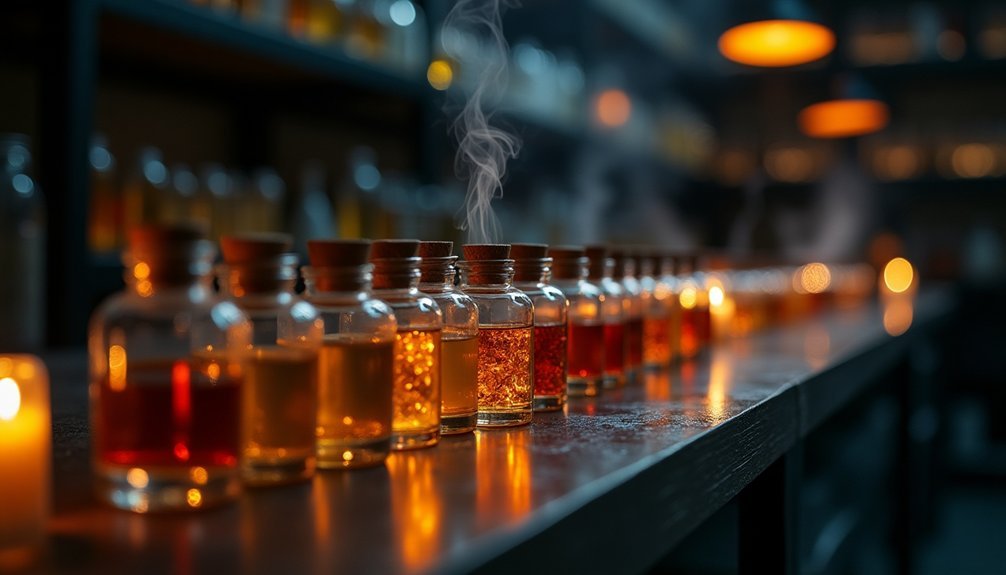
Capturing accurate data during nighttime fragrance testing requires systematic documentation methods that build upon the insights gained from calm environment assessments.
When you're evaluating scent performance overnight, you'll need specific documentation techniques to track how fragrances evolve during sleep.
- Record your initial impressions immediately after applying the fragrance before bed
- Monitor fragrance interaction with bedding materials using scent-tracking sheets
- Document any changes in scent intensity and character at specific time intervals
- Take note of how the fragrance feels on your skin throughout the night
- Compare morning results to evening application notes to assess longevity
These methods help perfumers understand the full experience of wearing perfume to bed, revealing how fragrances transform during rest and providing valuable insights for future formulations.
Frequently Asked Questions
How to Know Which Perfume Is for Day or Night?
You'll know a daytime perfume by its light, citrusy, or floral notes that energize, while nighttime fragrances feature rich, warm notes like vanilla and amber that're more sensual and relaxing.
Do Tester Perfumes Smell Like the Original?
You'll find that tester perfumes generally smell similar to the originals, but slight variations can occur. Your body chemistry and storage conditions may affect how testers develop compared to original fragrances when you wear them.
Why Do People Spray Perfume Before Bed?
You'll spray perfume before bed to create a relaxing atmosphere and enhance sleep quality. It's part of a calming bedtime ritual, and certain scents like lavender can help condition your mind for rest.
Why Do I Smell Perfume in the Middle of the Night?
You're likely noticing perfume more at night because your body heat intensifies fragrances, there are fewer competing smells, and your olfactory system is more sensitive during quiet nighttime hours when distractions are minimal.
In Summary
You'll find that fragrance testing at night provides essential data about how scents evolve on your skin. Your body's natural temperature fluctuations, reduced environmental interference, and calm testing conditions create the perfect scenario for analyzing a fragrance's true performance. When you understand how a scent behaves during rest hours, you're better equipped to choose fragrances that'll work throughout your entire day.
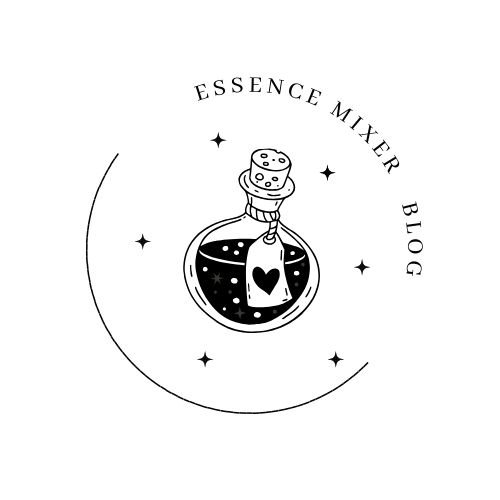
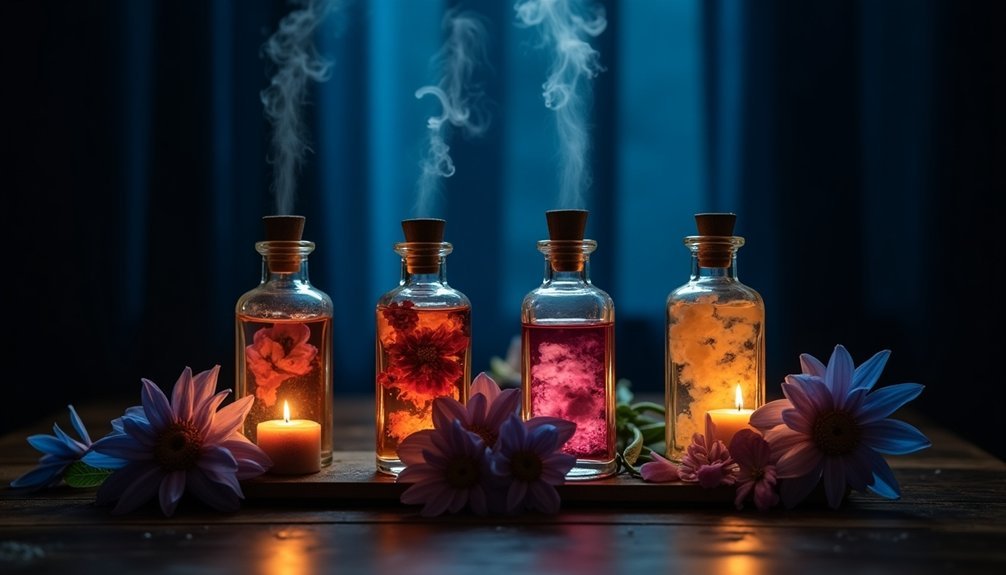

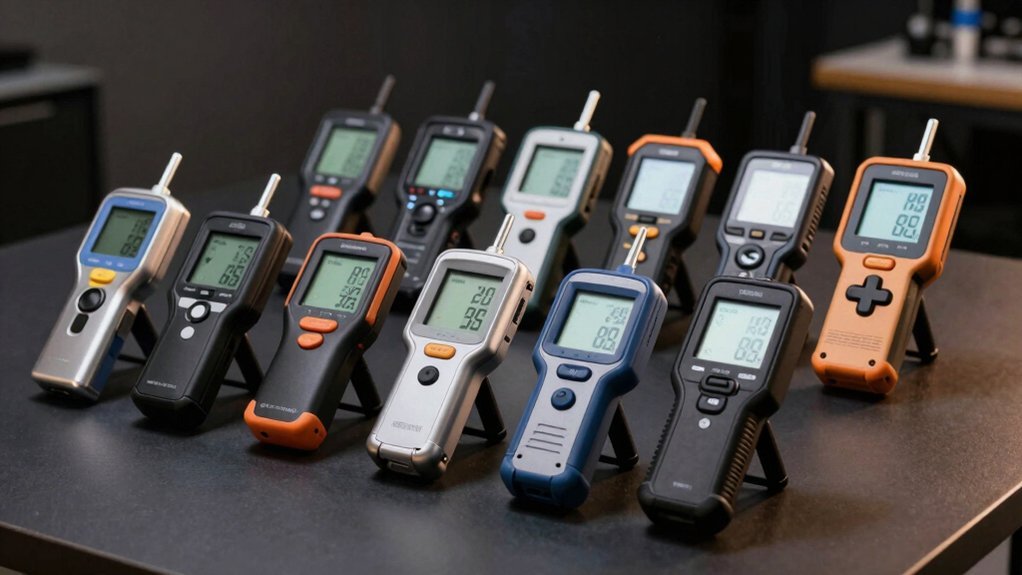
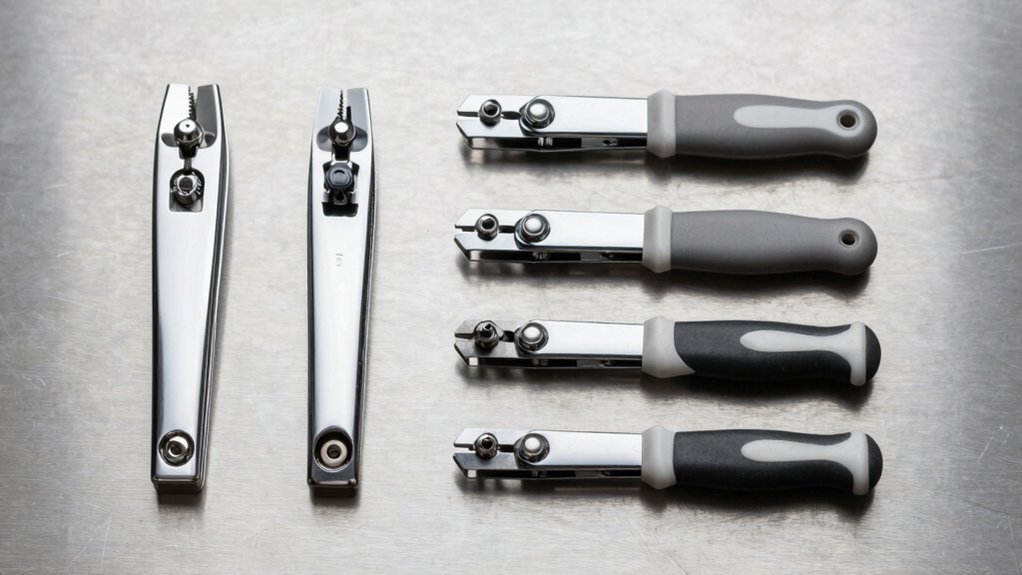
Leave a Reply